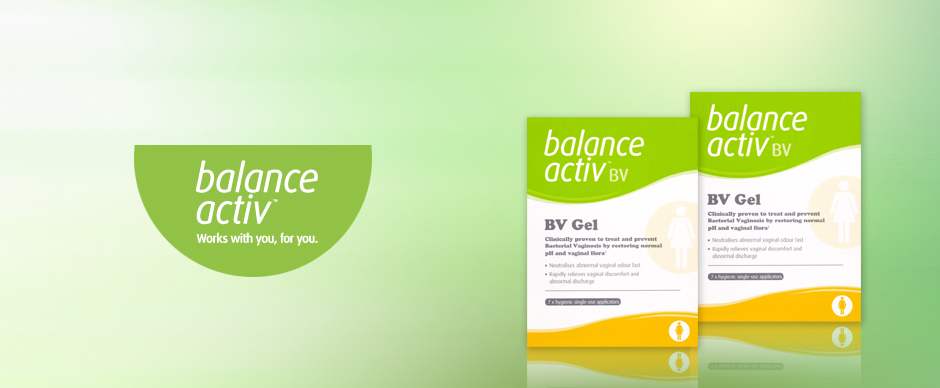
Vaginal Imbalance
Different types of bacteria live naturally in the vagina; normally the bacteria in the largest numbers are lactic acid bacteria. Lactic acid bacteria make lactic acid which maintains the normal low pH of the vagina, protecting against infection. When the number of lactic acid bacteria falls, pH levels rise, allowing the growth of other bacteria.
The growth of the other, unwanted, bacteria can result in an embarrassing fishy smell, abnormal discharge and discomfort in the vagina. The growth of these bacteria is known as a condition called Bacterial Vaginosis or BV. BV is very common - experts estimate that at least 1 in 3 women, and perhaps most women, will develop BV at some point in their life.
Balance Activ is associated with:
- Having a longer than normal period.
- Having an IntraUterine Device (IUD’s, commonly known as the coil).
- Regular douching (washing out the vagina).
- Using perfumed intimate products (such as feminine washes, sprays etc)
- Having sex without a condom (sperm has a higher pH level than the vagina)
- Other causes can include having a new sexual partner (without using a condom), having multiple sexual partners (without using a condom), having a same-sex sexual partner and changes in your hormone level (Teens experience disturbed hormone patterns when your periods first occur).
You do not have to be sexually active to get BV; women who have never had sex can still get BV. BV is a bacterial imbalance and is not caused by poor hygiene.
Most people think that Thrush is the most common type of vaginal infection, but BV is actually the most common condition in women of childbearing age – it’s about twice as common as Thrush.
Tackling the problem:
If you think you have BV, there are a number of things you can do:
- If you are happy to see your doctor, then they might prescribe you antibiotics. Some doctors will want to take a swab from your vagina to send to the laboratory for gnosis; some will diagnose from your description of your symptoms.
- The antibiotics are likely to cure the condition; however, they may destroy most of the bacteria in your vagina. When the bacteria grow back again it can be difficult to get the right balance between the normal bacteria you need, and the unwanted bacteria, so you could get BV again.
- Some women try yoghurt or other home remedies to relieve their symptoms. These can help but tend not to be completely effective. They can also be messy.
- Balance Activ™ Vaginal Gel is a new product containing both lactic acid to immediately restore the pH level of the vagina, and glycogen to encourage the growth of the normal bacteria.
What If I Don't Do Anything?
If you don’t do anything the symptoms could go away on their own, but there’s no guarantee. It is unusual for BV to cause problems in women who are otherwise healthy, and not pregnant.
However, recent research has shown that women with BV have a higher chance of getting Pelvic Inflammatory Disease (which can lead to infertility). Having BV has also been linked to an increased chance for women to catch STI’s e.g. chlamydia. In particular, research has shown that it is easier for women to catch and transmit HIV if they have BV.
When To See Your Doctor:
You should consult your doctor if:
- Your symptoms get worse.
- You experience pain.
- The discomfort does not go away.
- The discharge is blood-stained.
Your doctor can take a swab sample from your vagina which will be sent to the laboratory for analysis. Other tests may also be done to rule out other causes of vaginal discharge. The results will confirm whether you have BV or another condition. Your doctor can then advise you on the best course of action.
Balance Activ in Pregnancy:
If you are (or you think you might be) pregnant, you should consult your doctor if you have any of symptoms of vaginal infection during your pregnancy.
If you have BV while you are pregnant it could cause you to miscarry or could cause the baby to be born prematurely.

